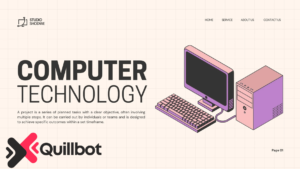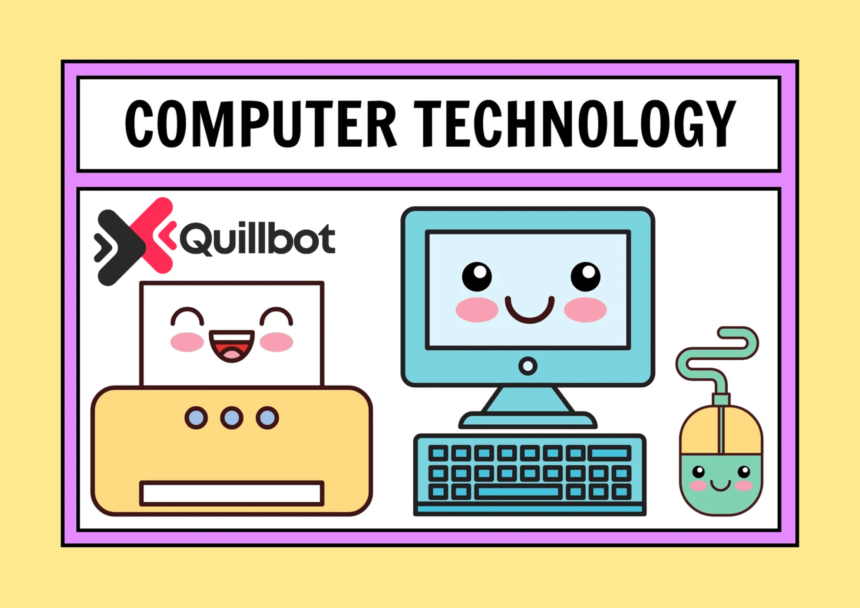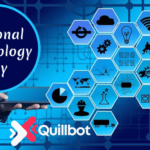Introduction to Computer Technology
Computer technology has rapidly evolved, becoming an integral part of modern life. From the first mechanical computers to today’s highly advanced digital systems, technology has drastically changed the way we live and work. In this article, we will explore the history of computer technology, its current applications, and how it continues to shape our future.
The History of Computer Technology
The journey of computer technology began with early mechanical calculators. These devices, like the abacus and Charles Babbage’s Difference Engine, were designed to perform basic arithmetic calculations. However, it wasn’t until the 20th century that significant advancements occurred.
In the 1940s, the first electronic computers were created, which paved the way for modern computer technology. These early computers were large and expensive, requiring entire rooms to operate. Over the next several decades, computer technology progressed rapidly, with the introduction of microprocessors in the 1970s and personal computers in the 1980s.
Key Milestones in Computer Technology
- The Invention of the Microprocessor: In 1971, Intel introduced the microprocessor, which is often considered the “brain” of modern computers. This small chip contained all the necessary components for running a computer, allowing for the development of personal computers.
- The Rise of the Internet: In the 1990s, the internet became widely available, changing how people communicate and access information. The internet opened up new possibilities for computer technology, enabling global connectivity and the creation of online services.
- The Era of Smartphones: In the 2000s, the advent of smartphones brought computer technology into the palm of our hands. Smartphones are now powerful devices that offer computing capabilities, allowing users to browse the web, watch videos, and run apps on the go.
The Importance of Computer Technology in Everyday Life
Today, computer technology is embedded in nearly every aspect of our daily lives. From smartphones to laptops and cloud services, technology is essential in both personal and professional settings. It has transformed industries like healthcare, education, finance, and entertainment. Here are a few key ways that computer technology has improved our lives:
1. Communication
One of the most significant advancements in computer technology is the ability to communicate instantly. Emails, social media, video calls, and messaging apps have made it easier to stay connected with people around the world. This has transformed both personal and professional communication.
2. Education and Learning
Computer technology has revolutionized education. Online learning platforms, virtual classrooms, and digital resources have made education more accessible than ever before. Students can now access courses, materials, and lectures from anywhere in the world.
3. Healthcare Advancements
In healthcare, computer technology has led to the development of electronic medical records, telemedicine, and advanced diagnostic tools. These innovations have made healthcare more efficient, accurate, and accessible.
4. Entertainment
Streaming platforms, video games, and digital content have changed the way we consume entertainment. With computer technology, we can enjoy movies, music, and games on-demand, anytime and anywhere.
Types of Computer Technology
The field of computer_technology is vast and includes many types of devices, systems, and software. Below are some of the main categories of computer_technology that have a significant impact on various industries.
1. Personal Computers (PCs)
Personal computers are the most common form of computer_technology used by individuals. They are used for a variety of tasks, such as browsing the internet, working on documents, playing games, and much more. Desktop computers and laptops are the two main types of PCs.
2. Servers
Servers are specialized computers that provide services to other computers over a network. They store data, host websites, and manage other critical operations for businesses. Servers are essential for running large-scale applications and managing cloud computing.
3. Cloud Computing
Cloud computing refers to the delivery of computing services like storage, processing, and software over the internet. This allows users to access powerful computing resources without needing to invest in expensive hardware. It is a key part of modern computer_technology, providing businesses and individuals with scalable solutions for their needs.
4. Artificial Intelligence (AI)
Artificial Intelligence (AI) is a branch of computer_technology focused on creating machines that can simulate human intelligence. AI is used in various fields, including machine learning, natural language processing, and robotics. AI has the potential to revolutionize industries such as healthcare, finance, and transportation.
5. Internet of Things (IoT)
The Internet of Things (IoT) refers to the connection of everyday devices to the internet. From smart thermostats to wearable fitness trackers, IoT devices use computer_technology to collect data, communicate with other devices, and improve efficiency.
The Future of Computer Technology
The future of computer_technology looks bright, with new innovations continuing to emerge. Here are some trends that are likely to shape the future of computer_technology:
1. Quantum Computing
Quantum computing is an area of computer_technology that uses the principles of quantum mechanics to solve problems too complex for traditional computers. While still in its early stages, quantum computing has the potential to revolutionize fields like cryptography, medicine, and artificial intelligence.
2. 5G Technology
5G is the next generation of mobile network technology. It promises faster internet speeds, lower latency, and better connectivity. This will enable more advanced computer_technology applications, such as autonomous vehicles and smart cities.
3. Augmented Reality (AR) and Virtual Reality (VR)
Augmented reality (AR) and virtual reality (VR) are immersive technologies that combine the digital world with the physical world. Computer_technology will continue to drive the development of AR and VR, creating new opportunities in entertainment, education, and business.

FAQs about Computer Technology
Q1: What is computer_technology?
A1: Computer_technology refers to the hardware, software, and systems used to process, store, and manage information. It includes devices like computers, smartphones, and tablets, as well as the technology behind them.
Q2: How has computer_technology impacted education?
A2: Computer_technology has revolutionized education by providing access to online learning platforms, digital resources, and virtual classrooms. This has made education more accessible and flexible.
Q3: What are the different types of computer_technology?
A3: Different types of computer_technology include personal computers, servers, cloud computing, artificial intelligence, and the Internet of Things (IoT).
Q4: What is cloud computing?
A4: Cloud computing refers to delivering computing services, such as storage and processing, over the internet. It allows users to access powerful computing resources without the need for physical hardware.
Q5: What is the future of computer_technology?
A5: The future of computer_technology includes advancements in quantum computing, 5G networks, artificial intelligence, augmented reality, and virtual reality.
Conclusion
In conclusion, computer_technology has played a crucial role in shaping the world as we know it today. From communication and education to healthcare and entertainment, its impact is vast and continues to evolve. The future of computer_technology looks promising, with emerging technologies like quantum computing, AI, and 5G poised to bring about even more transformative changes.









